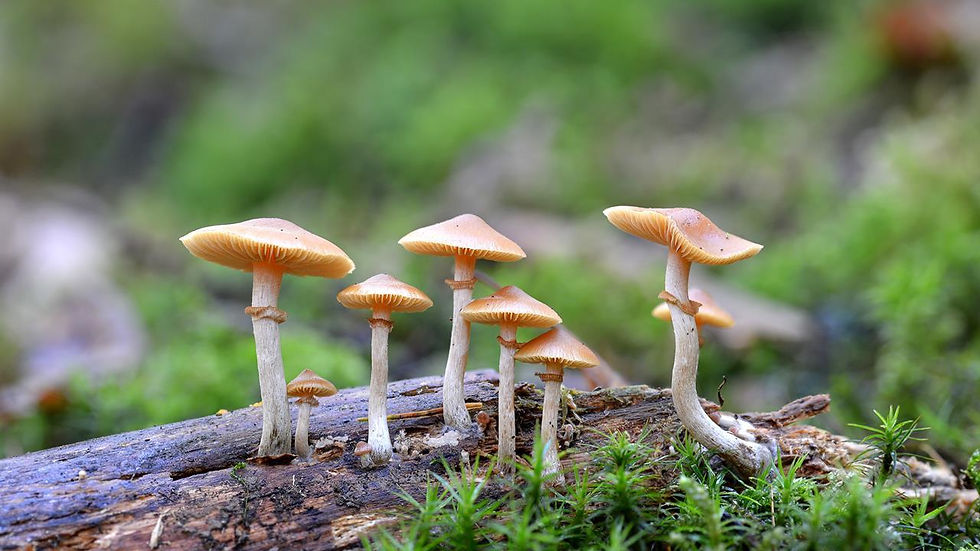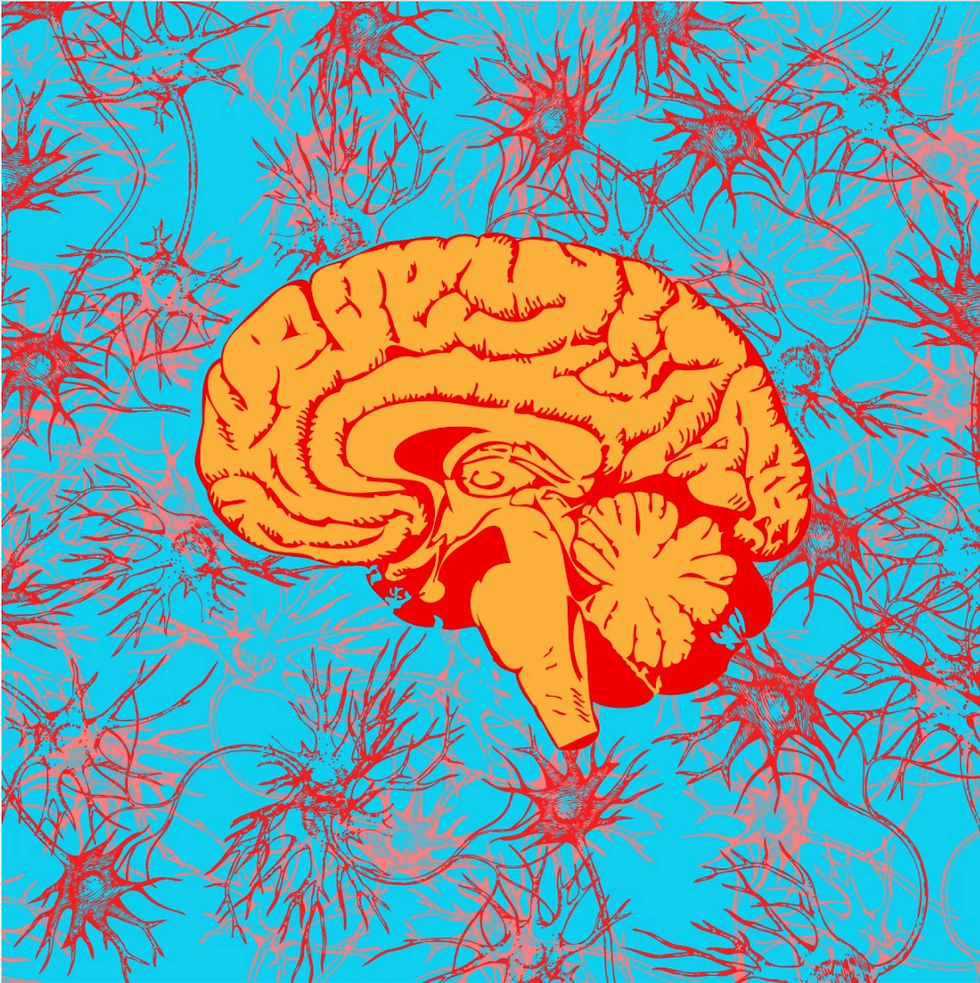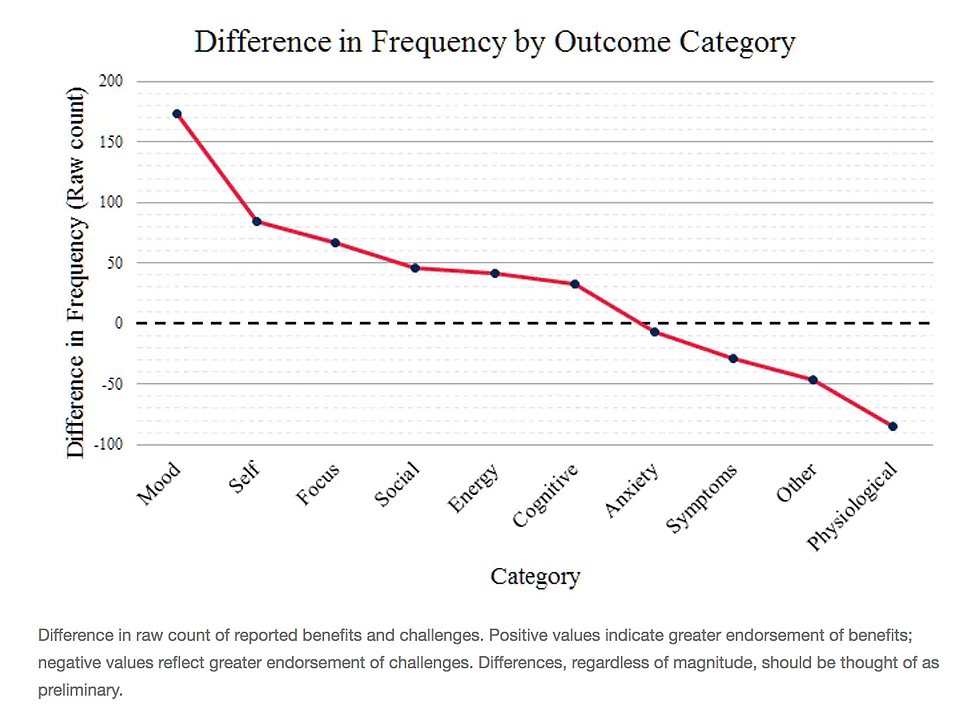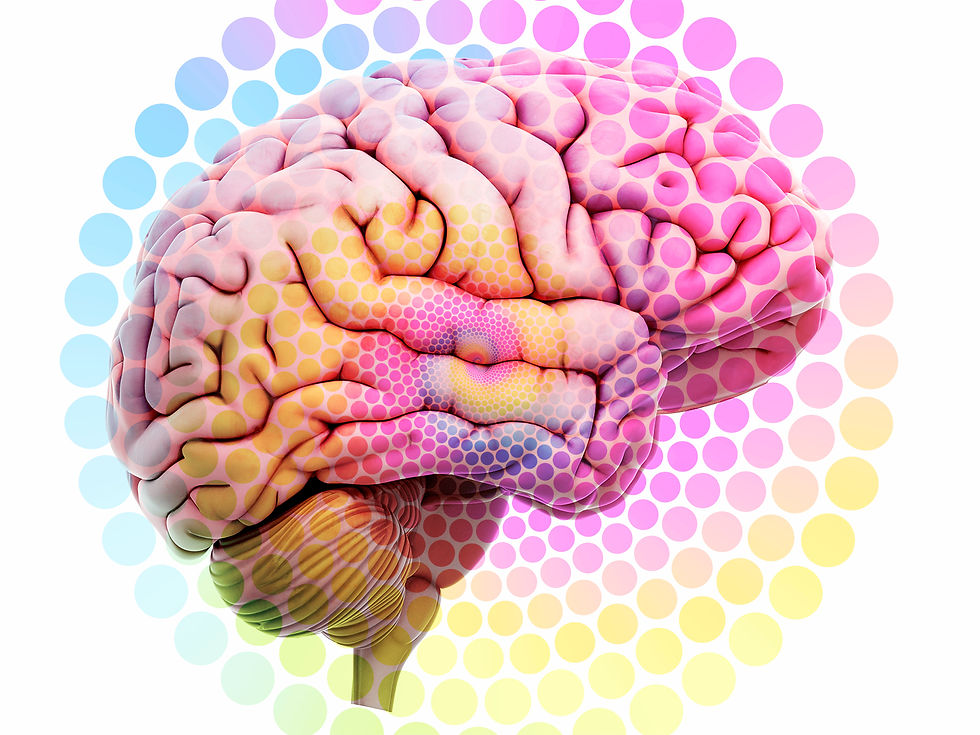(In which we explore and review 10 scientific studies)

Artwork by Tyler Tilley
INTRODUCTION:
While it’s impossible to put a number on how many people around the world struggle with anxiety and depression, it’s clear that the number is very high. Some health organizations estimate over 260 million are affected by depression worldwide. It’s safe to assume that in 2020 and 2021 that number has risen.
Those who seek help are usually treated with SSRIs or anti-depressants, and while this helps some, it leaves others in a similar state, or worse, and often with negative “side-effects” (aka effects). Treatment Resistant Depression is rising in North America, and it’s currently estimated that only about 30% of people who suffer from depression reach full remission or recovery.
In a world where depression and anxiety are rising, along with cases of Treatment Resistant Depression, it is of great importance that we explore all possibilities- whether ‘natural,’ ‘illegal,’ or taboo- that may help to heal and lift up the individual and humanity as a whole.
The treatment method we will be exploring is psilocybin microdosing, or ingesting a small, sub-perceptual amount of psilocybin.
There exists plenty of anecdotal evidence, as well as promising emerging research that suggests psilocybin microdosing may hold potential to benefit and heal those suffering from anxiety and depression.
It’s no surprise that in these strange and unnatural times, people are looking back to the earth, and to the creative power of mushrooms, as a potential aid or treatment to help improve their mental state, mood, and perspective on life.

APPROACH:
Similar to our “Can Microdosing Help WIth Creativity?” blog post, we will begin by exploring the general relationship between psychedelics and anxiety/depression. This will include the most up-to-date research on psilocybin macrodosing (large single doses) and psilocybin therapy as treatment for anxiety/depression. We will then hone in to examine the specific relationship between psilocybin microdosing and anxiety/depression.
Our goal here is to review the best available research and evidence in order to shed light on the relationship between psychedelics and depression/anxiety. If we determine that psilocybin microdosing does have an effect on depression/anxiety, we will then explore what the benefits and risks might be.
So, let’s dive in to the research!
MACRODOSING:
1. One of the most well-known studies on psilocybin as treatment for mood disorders was conducted by John Hopkins (2016, Psychopharmacology). This randomized, double-blind trial studied the effects of psilocybin in cancer patients with life-threatening diagnoses and symptoms of depression and/or anxiety. Two doses of psilocybin (one high dose and one low dose) were administered 5 weeks apart, with a 6-month follow-up.
So, what were the results?
“The data show that [high-dose] psilocybin produced large and significant decreases in clinician-rated and self-rated measures of depression, anxiety or mood disturbance, and increases in measures of quality of life, life meaning, death acceptance, and optimism. These effects were sustained at 6 months… with about 80% of participants continuing to show clinically significant decreases in depressed mood and anxiety.”

It’s also worth noting that “no serious adverse events attributed to psilocybin administration occurred.”
2. Another similar study (2016, Psychopharmacology) had comparable findings:
“Single moderate-dose psilocybin (in conjunction with psychotherapy) was safely administered to a cohort of patients with cancer-related psychological distress (e.g. anxiety, depression). It produced rapid and sustained anxiolytic [anxiety reducing] and anti-depressant effects (for at least 7 weeks but potentially as long as 8 months), decreased cancer-related existential distress, increased spiritual wellbeing and quality of life, and was associated with improved attitudes towards death… Psilocybin, administered in conjunction with appropriate psychotherapy, could become a novel pharmacological-psychosocial treatment modality for cancer-related psychological and existential distress.
These findings hold great social importance as “cancer patients often develop a chronic, clinically significant syndrome of psychosocial distress having depressed mood, anxiety, and reduced quality of life as core features, with up to 40% of cancer patients meeting criteria for a mood disorder.” These symptoms have been associated with decreased treatment adherence, prolonged hospitalization, decreased quality of life, and increased suicidality.
These findings are important not only for cancer patients, but perhaps for broader humanity, as a higher level of existential and spiritual wellbeing has been linked with improved quality of life and decreased depression, anxiety, and hopelessness.
These are not the only studies to have demonstrated the positive and beneficial effects of psilocybin on cancer-related depression and anxiety. The scientific literature in this area is constantly growing.
3. This next study (2017, Mental Health Clinician) sought to provide an in-depth review of previously conducted studies and to explore the effectiveness of psilocybin as a treatment for various mental health conditions, including depression, anxiety, OCD, and alcohol and tobacco addiction.
In relation to depression, the study found that “The odds of all of the outcomes [psychological distress and suicidality] were reduced in the psilocybin-only group compared to the no psychedelic use group. Past-year suicidal thinking and planning were lower in the psilocybin group compared to the psilocybin and other psychedelics group. Finally, the odds of past-month psychological distress were lower in the psilocybin group relative to the other psychedelics-only group. Based on this data, the psilocybin group appeared to fare better than any other group. This further supports the idea that psilocybin may play a role in reducing suicidality and improving mood although these patients did not necessarily have a diagnosis of major depressive disorder. It also highlights the potential safety of the substance in such a large population.”
In relation to anxiety, the study found that ”Anxiety significantly decreased as measured by the State-Trait Anxiety Inventory at 1 and 3 months post-treatment in the psilocybin group compared to niacin. Mood improved for 2 weeks after treatment and reached statistical significance on the Beck Depression Inventory at the 6-month point with the same comparison."
"...These studies all show potentially positive benefits with minimal safety concerns for psilocybin use in suicidality, anxiety disorders, OCD, alcohol use disorder, and tobacco use disorder with improvement in target symptoms."
Great!
Onwards!

4. This next study (2017, Therapeutic Advances in Psychopharmacology) focused specifically on the role of psilocybin in the treatment of depression. The researchers reviewed the current research and evidence to explore the effectiveness and safety of psilocybin as a treatment for depression.
One study they examined concluded that “Psilocybin was well tolerated by all patients, and no serious or unexpected adverse events were reported. Relative to baseline, depressive symptoms were markedly reduced at 1 week and at 3 months after treatment.”
In relation to the safety of psilocybin, they cite another study that found “no sustained deleterious physiological or psychological effects.” And a second study exploring the effects of psilocybin on anxiety in patients with advanced-stage cancer that reported “no clinically significant adverse effects.”
Another study showed that “There is a growing evidence base suggesting a neurobiological basis for the possible efficacy of psilocybin in unipolar depression.”
This same study examined the psycho-biological mechanisms at work behind psilocybin, and concluded that “the effect of psilocybin strongly points at a therapeutic mechanism in depression… Psilocybin has been found to robustly facilitate activation of various areas of the brain, including the limbic system, in response to autobiographical memory cues. Such facilitation of the recall of salient memories during psychotherapy may be of significance.”
This study, like most in the psilocybin research arena, presents a tentatively hopeful conclusion: “Thus, although limited, the current evidence base suggests that psilocybin may prove to be a safe, feasible, and efficacious pharmacological agent for depression, at least in patients not responding to conventional therapies.”
5. This fascinating study (2012, National Academy of Sciences) was conducted by prolific psilocybin researcher Robin Carhart-Harris. It used fMRI on individuals who had been administered psilocybin in order to gain insight into the transition from “normal” waking consciousness to the psychedelic state.
As the researchers pointed out in the abstract, “despite renewed interest in their [psychedelics] therapeutic potential, we continue to know very little about how they work in the brain.”
This study found that “profound changes in consciousness were observed after psilocybin,” but perhaps surprisingly, the most marked changes observed in the brain had to do with decreased blood flow and activity in certain key areas, rather than the perhaps-expected increase of activity.
The researchers concluded that the fMRI results “strongly imply that the subjective effects of psychedelic drugs are caused by decreased activity and connectivity in the brain's key connector hubs, enabling a state of unconstrained cognition.”
So, why is this significant in relation to depression/anxiety?
One writer put it well: “The memorably vivid emotional experiences reported by mushroom users may flourish because the parts of the brain suppressed by psilocybin usually keep our world view tidy and rational.”
As Carhart-Harris stated, "The brain is doing a lot to keep our experiences of the world orderly and constrained... Depression can be described as a particularly restrictive state of mind... People are stuck on how terrible they are.”
This research seems to suggest that through allowing people to experience an unrestricted state of cognition under psilocybin, they may be able to explore new modes of conscious awareness, and potentially to break free from restrictive, negative habits of thinking through this “mental openess” that allows the world and the self to be explored from different perspectives, and encourages new and novel mental pathways to be formed.

MICRODOSING:
So, now that we’ve established a promising relationship between depression/anxiety and psilocybin at higher dosages, let’s zoom in to focus on the research surrounding psilocybin microdosing as a potential treatment.
6. This first study (2020, Therapeutic Advances in Psychopharmacology) investigated “whether there are scientific grounds to state that this practice [microdosing] could be helpful in the treatment of affective disorders, and safe to use repeatedly.” To this end, it reviewed 14 studies where low doses of psilocybin or LSD were used.
Findings showed that both psilocybin and LSD microdoses have subtle positive effects on cognitive processes (time perception, convergent and divergent thinking) and brain regions involved in affective processes. “Besides the pleasant experience, increased anxiety and a cycling pattern of depressive and euphoric mood were also found. With regard to safety, it was demonstrated that low doses are well tolerated and have no-to-minimal effects on physiological measures.”
These findings are fascinating, and highlight how little scientific research has been conducted on microdosing, and how much we have yet to discover. Also, the reported slight feelings of increased anxiety is consistent with anecdotal evidence, and confirms the idea that psilocybin microdosing is a dynamic experience, dependent on many factors, and different for each individual. As for the “cycling pattern of depressive and euphoric mood,” we theorize that this effect is associated more with LSD than psilocybin, as LSD is known to act in waves and cycles, while psilocybin offers a more steady ascent and decline.
This study concludes, once again, in a cautiously optimistic tone: “While it is yet unclear whether psychedelic microdosing is of therapeutic value for depression, the aforementioned effects on selective processes suggest that low doses of psychedelics could play a role in depression by inducing some kind of cognitive flexibility, which might lead to decreased rumination.”
7. Another study (2019, Harm Reduction Journal) sought to reconcile the gap between the widespread usage of microdosing and our relatively limited scientific understanding of its effects, benefits and potential risks. The researchers developed a codebook of benefits and challenges based on the reports of 278 microdosers, in order to quantitatively organize the findings.
They found reported increases in beneficial outcomes such as Improved Mood (26.6%) and Focus (14.8%), and also reports of Physiological Discomfort (14.8%) and Increased Anxiety (6.7%).

This study points out an interesting dichotomy between “improved mood” and “increased anxiety” while microdosing. The two are not necessarily mutually exclusive as they may be experienced at different points, for different spans of time, and at different intensities. Anyone who has experience with psychedelics at any dosage knows that the benefits are not without risk, and that the upside does not always come for free. However, the more we come to understand and respect these substances, the more we can be prepared to feel and accept the whole range of potential experiences they help to evoke. Sometimes being with an uncomfortable feeling is the best way to deal with it.

We can draw the following general conclusions from this study: Each person experiences microdosing differently. Each dose day is different. Microdosing offers benefits and challenges. More exploration, research and learning is necessary.
8. Another study (2019, Psychopharmacology Journal) assessed the differences in mental health, personality, and creativity in microdosers and non-microdosers.
They found that current and former microdosers scored lower on measures of dysfunctional attitudes and negative emotionality, and higher on wisdom, open-mindedness and creativity when compared to non-microdosing controls.
This study suggests a positive correlation between microdosing and improved mental health. The researchers concluded that these promising findings warrant further controlled experimental research, and that this exciting new microdosing paradigm holds potential to shape future treatment of mental health.
9. This next study (2020, Psychopharmacology Journal), which examined the reports of 1102 respondents who reported current or past experience with psychedelic microdosing, found that 21% of respondents reported microdosing as a therapy for depression, 7% for anxiety, 9% for other mental disorders, and 2% for substance use cessation or reduction. 44% of respondents perceived that their mental health was “much better” as a consequence of microdosing.
The researchers concluded that with the promising findings of initial studies, continued clinical microdosing research is recommended in order to determine its potential role in psychiatric treatment as well as in self-managed mental health and substance use therapy.

10. Let’s finish with a very fascinating and enlightening study, titled “Twenty percent better with 20 micrograms?” (2019, Harm Reduction Journal). This study provides a rich substrate of data and reported experiences from a wide range of individuals with microdosing experience. The researchers, from Karlstad University in Sweden, qualitatively analyzed data collected from self-disclosure videos and comments across YouTube using specialized data collection software, and included participants who microdosed with both psilocybin and LSD.
To begin, motives for microdosing were either a form of self-treatment (eg. disorders), self-optimization (eg. enhancing “normal” function), or a mix of both. In other words, microdosing is primarily used for therapeutic or enhancement purposes. The researchers found that mostly beneficial effects were reported, and that therapeutic effects for depression appeared especially noteworthy.
Interestingly, microdosing was discussed among participants as one of several modalities in a personal health-seeking endeavor, along with diet, exercise, meditation and other tools and techniques that promote health and well-being. In this holistic approach, microdosing was viewed as a catalyst for improving the overall direction and results of personal health and self-optimization efforts.
One respondent stated, “I was already doing things to become less anxious and depressed, and to have more confidence. Things like yoga, meditation, eating right, working out, and doing personal development. But once I added mushrooms, it was like all of that, put on steroids.”
Several mental or pathological disorders, commonly resistant to previous curative efforts, were reportedly alleviated or eased by microdosing. Most commonly, depression- including long-term depression and hard to treat cases- was said to be cured entirely or significantly eased.
One respondent was quoted as saying, “Microdosing LSD has been the best thing that happened in my life. Dealing with serious depression for 35 years… it’s now GONE!”
To us, the idea that psychedelic microdosing might help alleviate or improve mental health simply makes sense, as the main reported benefits of microdosing- improved mood, perspective, focus, energy, motivation, openness- all coincide with an overall more energetic and vital way of being. Perhaps, in the case of microdosing, depression is eased in a subtle, roundabout way- more akin to a gentle massage than a direct assault.
Of course, the opening of one's mind, and the alteration of one’s mental patterns can have risks, both in general and in the specific case of depression and anxiety, as this study attests to (more on this below). Helping one to become aware of trauma and to see the underlying causes of depression and anxiety more clearly may ease the symptoms in some cases, while in other cases this sudden clarity may potentially increase anxiety and despair.

The promising takeaway of this study is that many microdosers reported their depression and anxiety was lifted, and they experienced liberation from catastrophizing thought patterns. Freedom from dysfunctional beliefs and improved disease insight were cited as benefits of microdosing by sufferers of various psychological issues.
Individuals with trauma, PTSD, addiction, bipolar disorder and anxiety also reported experiencing significant improvements with microdosing. For example, one respondent reported, “I’m bipolar and used anti-depressives my entire life. The only medicine that works for me is psilocybin mushrooms. I microdose and grow my own now. I have never felt better.”
The risks and potential unknown factors on the other side of the coin must also be addressed: Reports involving anxiety in particular were disparate from other indications, as some respondents reported experiencing increased anxiety and negative emotions while microdosing. One possible explanation for this, as touched on above, is that the revealing, anti-amnesic- or memory and insight-inducing- properties of psychedelics may potentially result in increased awareness of the troubling sides of personal circumstances, which could lead to elevated anxiety. This is one reason why intention and a prepared mindset is an important aspect of any psychedelic experience.
Like many forms of therapy or healing, microdosing psychedelics offers both benefits and challenges. The awareness of trauma can bring with it pain. With clarity and vision comes responsibility to act upon new insights. However, there is some truth to the statement that the only way to get past something is to go through it. This is rarely easy, but often rewarding. Even “healthy individuals” carry a degree of trauma and fear that impacts the quality and function of life, and microdosing was often found to facilitate awareness and thereby transcendence of these traumatic “imprints.”
In conclusion, the researchers of this study found that beneficial therapeutic outcomes of microdosing were facilitated by the following factors:
1) motivation to handle issues was raised by immediate increases in mood, energy and presence
2) awareness of problems and solutions was raised by access to new perspectives, and a sense of reconnecting with an authentic self and with core beliefs
3) change of habits and mindset was facilitated by increased affinity for healthy lifestyle factors and a sense of adaptability
The growing trend of microdosing and its reported benefits is highly interesting, and more study is needed to explore long-term risks and to more clearly understand potential benefits. Microdosing could potentially provide some of the same benefits as full-dose therapies with less risk of adverse reactions related to the sometimes intense experiences of higher doses.

CONCLUSIONS:
So, let’s tie all this together, shall we?
Since depression/anxiety are often linked with rigid and restrictive thought patterns and states of mind, it may be reasonable to hypothesize that the more gentle breakdown of deeply-grooved thought patterns, and the subtle shift in perspective combined with the lifting of mood and spirit provided by psilocybin microdosing- in contrast to the slightly more shocking and disruptive nature of psilocybin macrodosing- may provide a suitable mental environment and change of internal landscape to help facilitate positive change and existential breakthroughs in relation to depression/anxiety.
Apologies for the wordiness. Hopefully the core sentiment shines through.
In simple terms, if your brain is stuck in one way of thinking- for example, ruminating over the past or worrying about the future- psilocybin microdosing may help the brain to create new neural pathways, which permits for new ways of thinking and “un-stuckness.”
Psilocybin microdosing may lift depression/anxiety by helping people have a slightly better day than normal. What does this look like, practically? Over the course of a microdosing day, a person may be more aware than normal of their own body, their breathing, their posture, and the present moment. They may have more energy and motivation to do what they wish to do and to deal with the problems and challenges at hand. They may have increased focus, flow, and creative capacity with which to approach a project with clarity and flexibility. They may feel a subtly lifted mood, a more optimistic perspective, and more openness toward having free, natural interactions with those around them.
It is our hypothesis that microdosing offers a more functional, balanced, and holistic experience in comparison to macrodosing. While macrodosing provides the opportunity for many wonderful breakthroughs, epiphanies, and even life-changing experiences, microdosing offers a window to subtly shift one’s perspective or standard mode of being, giving one the opportunity to remain “functional” in a non-hallucinogenic state of mind, while also being able to approach the present moment and the problems or challenges at hand with a subtly yet powerfully open and fresh perspective.
Microdosing is like walking through a beautiful door into an interesting room you’ve never been in before, while macrodosing might be more akin to sky-diving, or taking a trip to a new world and a completely different dimension of being. It’s a very loose analogy, but you get the idea.
This very optimistic blog post would not be complete without clearly stating that there is no guaranteed, miraculous cure-all for depression/anxiety. Psilocybin as a treatment, whether in macro or micro dose, will be ineffective or unsuitable for some. As the above research makes clear, the many potential benefits of psilocybin as treatment for depression/anxiety far outweighs the complete lack of significant, notable risks.
We are still at the very beginning of microdosing research. Serious research into psychedelics was halted from the 1960’s until quite recently, and microdosing has only begun to gain popular, widespread traction as a niche of psychedelic usage over the past few years. The very first scientific studies on microdosing have been conducted over the course of the past decade, making microdosing an extremely nascent area of study, with much still to be explored, discovered and revealed.
Microdosing clearly has benefits in many areas, including mental health. There is a place for it amongst the tools and techniques- diet, exercise, meditation, etc- that help facilitate a holistic, healthy lifestyle. As most of the above studies point out, more research and experimentation is required to clarify the most ideal and effective use cases and applications, so that we might continue to grow in our understanding of how psychedelic microdosing can benefit the individual and humanity as a whole.
We encourage each person to experiment and learn for themselves, equipped with the education and information they need in order to experiment responsibly and safely. After all, what is life but a beautiful experiment, a journey of discovery and growth!
Please share this article with anyone you think may be interested, or who might benefit from this information.
Wishing the best for all humans and all living things.

Read our Psilocybin Microdosing Manifesto HERE
---------------------------------------------
Quotes from Third Wave [link] survey respondents on how microdosing helped them overcome undesirable states:
“Microdosing doesn’t allow me to be anywhere else but in the present moment. This has helped me tremendously with my anxiety and depression. I am incapable of worrying about what’s going to happen next week, tomorrow, or even five minutes from now. I can function without anxiety for the first time in years. I feel that my attention span is greater, I’m concentrating like never before. When I was suffering with pain I was given a lot of prescription pain pills and was quickly becoming addicted to them. Microdosing instantly helped me stop taking the several pills a day I was taking just so I could get out of bed, and I haven’t touched them since.”
“I have fought depression for some 6-7 years since adolescence. Microdosing has, so far, consistently helped me get on with my day-to-day, just as much on non-microdosing days as on microdosing days. This also applies to social and general anxiety which has been less severe but experienced for the same period.”
“I overcame my depression with microdosing because I can consistently be productive and happy with it as a creative booster. It also eliminates any anxiety I get because I never used to raise my hand in class. I smoke a lot of cannabis and it’s unhealthy to overindulge. I found microdosing makes me feel the need to be productive so I smoke much less when I microdose and don’t indulge just to smoke.”
---------------------------------------------
SOURCES:
1. Psilocybin produces substantial and sustained decreases in depression and anxiety in patients with life-threatening cancer: A randomized double-blind trial. Journal of Psychopharmacology, 2016.
2. Rapid and sustained symptom reduction following psilocybin treatment for anxiety and depression in patients with life-threatening cancer: a randomized controlled trial. Journal of Psychopharmacology, 2016.
3. Clinical potential of psilocybin as a treatment for mental health conditions. The Mental Health Clinician, 2017.
4. Role of psilocybin in the treatment of depression. Therapeutic Advances in Psychopharmacology, 2016.
5. Neural correlates of the psychedelic state as determined by fMRI studies with psilocybin. National Academy of Sciences, 2012.
6. The therapeutic potential of microdosing psychedelics in depression. Therapeutic Advances in Psychopharmacology, 2020.
7. Psychedelic microdosing benefits and challenges: an empirical codebook. Harm Reduction Journal, 2019.
8. Microdosing psychedelics: personality, mental health, and creativity differences in microdoses. Psychopharmacology, 2019.
9. Perceived outcomes of psychedelic microdosing as self-managed therapies for mental and substance use disorders. Psychopharmacology, 2020.
10. Twenty percent better with 20 micrograms? A qualitative study of psychedelic microdosing self-rapports and discussions on YouTube. Harm Reduction Journal, 2019.

Comments